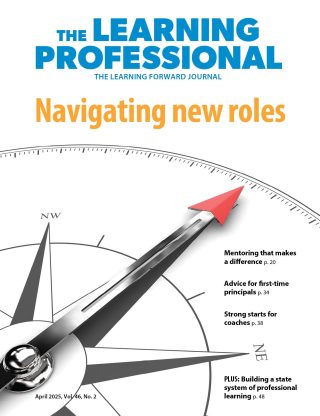IDEAS
Lasting Legacy For Achievement
Colorado Coaches Boost Teacher Effectiveness With a Rubric For Professional Learning
By Learning Forward
October 2012
Vol. 33 No. 5
Read the remaining content with membership access. Join or log in below to continue.
Sed ut perspiciatis unde omnis iste natus error sit voluptatem accusantium doloremque laudantium, totam rem aperiam, eaque ipsa quae ab illo inventore veritatis et quasi architecto beatae vitae dicta sunt explicabo. Nemo enim ipsam voluptatem quia voluptas sit aspernatur aut odit aut fugit, sed quia consequuntur magni dolores eos qui ratione voluptatem sequi nesciunt. Neque porro quisquam est, qui dolorem ipsum quia dolor sit amet, consectetur, adipisci velit, sed quia non numquam eius modi tempora incidunt ut labore et dolore magnam aliquam quaerat voluptatem.
Facilitator's Rubric For Professional Learning
| Weld County School District Re-8, Fort Lupton, Colo.
In summer 2009, achievement coaches reviewed current literature and best practices for facilitating professional learning for teachers. This led to a commitment to increase coaching skills of professional learning facilitators by creating a rubric to plan, implement, and evaluate professional learning. Coaches and facilitators also used the rubric to guide their own professional learning. |
|||||
| Stage | Indicator | Advanced | Proficient | Partial proficient | Unsatisfactory |
| Plan | Clear outcomes and goals | Goals are documented as SMART goals. Plan is created for teachers to monitor progress on goals. | Goals are documented as SMART goals. Plan is created to share goals orally and visually. | Goals are documented. No plan is created to share goals. | No clear outcomes or goals. |
| Preassessment plan | Preassessment is based on goals. Plan for instructional options is created for differentiation. | Preassessment is based on goals to measure teacher readiness for content. | Preassessment plan is vague or irrelevant. | No preassessment plan. | |
| Peer review of plan | Professional development plan has been shared through multiple planning conversations before written plan. Written professional development plan is reviewed through multiple reflective conversations. | Professional development plan has been shared with a peer through a planning conversation before written plan. Written professional development plan is reviewed through a reflective conversation. | Professional development plan has been discussed with a peer before written plan or written plan has been informally reviewed by peers. | No discussion before written plan and no peer review of written plan. | |
| Rationale | Rationale is based on district or building-specific student data or teacher need and is backed by research data and researched best practice. | Rationale is based on student data or teacher need and is backed by research data. | Rationale is based on perceived need. | No rationale or rationale is based on personal preference. | |
| Facilitation strategies and transitions | Facilitation resources are embedded in the outline in order to assist in differentiation. | An outline shows evidence of a variety of adult learning strategies, triple tracking, and effective time management. | An outline or personal notes are prepared, but lack evidence of learning strategies, triple tracking, or time management. | No outline. | |
| Learning cycle | Facilitator uses an object, event, data, or question to engage participants with intended receptiveness. Facilitators activate participants’ prior knowledge and guide interactive activities through modeling, questioning/probing, providing resources, and giving immediate and meaningful feedback to participants. Participants construct, apply, and extend their knowledge of concept. | Facilitators activate participants’ prior knowledge and guide interactive activities through modeling, questioning/probing, providing resources, and giving immediate and meaningful feedback to participants. Participants construct, apply, and extend their knowledge of concept. | Facilitator makes minimal connections to participants’ prior knowledge, guides some activities through modeling and questioning/probing, and gives minimal feedback to participants. Participants are given few opportunities to construct, apply, and extend their knowledge of concept. | Facilitator does not engage participants to begin session. Facilitator does not provide modeling, questioning, or feedback to students. Participants are given no opportunities to construct, apply, and extend their knowledge of concept. | |
| Engagement | Participants have multiple opportunities to effectively communicate, synthesize learning, and produce desired outcome within instructional setting (whole group, small group, partner, individual). Facilitator tailors communication strategies so that participants effectively express, listen, and adapt to others. | Participants have multiple opportunities to effectively communicate, synthesize learning, and produce desired outcome within instructional setting (whole group, small group, partner, individual). | Participants have few opportunities to communicate, synthesize learning, and produce desired outcome within instructional setting (whole group, small group, partner, individual). | Participants have no opportunities to communicate, synthesize learning, and produce desired outcome within instructional setting (whole group, small group, partner, individual). |
| Stage | Indicator | Advanced | Proficient | Partial proficient | Unsatisfactory |
| Differentiation | Facilitator implements effective instruction to address a range of learner needs. Instruction is more qualitative (deeper) than quantitative (more work). Instruction is rooted in assessment and is learner-centered. Instruction provides multiple approaches to content, process, and product. Extended activities are available for participants who demonstrate proficiency on preassessment. Participants and facilitator are learners together. | Facilitator implements effective instruction to address a range of learner needs. Instruction is more qualitative (deeper) than quantitative (more work). Instruction is rooted in assessment and is learner-centered. | Facilitator’s instruction addresses the needs of the majority. All participants work on the same task at the same time. Instruction is mostly facilitator-directed. | Facilitator’s instruction addresses the middle participant with no differentiation. All participants work on the same task at the same time with absence of any assessment. Instruction is facilitator-directed. | |
| Formative assessments | Facilitator consistently applies a variety of formative assessment strategies to monitor progress on specific goals in a timely manner, provides specific, individualized feedback to participants, and adjusts the facilitation plan as needed for individuals and the group. | Facilitator applies formative assessment strategies to monitor goals throughout the learning process, provides feedback to participants, and adjusts the facilitation plan as needed for the group. | Facilitator applies some formative assessment strategies related to goals, provides general feedback, and may make some adjustments in the facilitation plan. | Facilitator does not measure participants’ progress in meeting goals during the learning process. | |
| Sustainability | Facilitator provides multiple resources for further research and review. Participants walk away with a written plan and timeline to implement as well as a plan to instruct/share the strategies, concepts, or practices in their classrooms/building. | Facilitator provides adequate resources for further research and review. Participants walk away with a written short- and long-term plan to implement the strategies, concepts, or practices in their classrooms. | Facilitator provides few resources for further research and review. Participants walk away with the intent to implement the strategies, concepts, or practices in their classrooms. | Facilitator provides no resources for further research and review. Participants walk away with no plan to implement the strategies, concepts, or practices in their classrooms. | |
| Feedback | Participants have an opportunity to complete a Likert scale, provide specific and descriptive written comments, and engage in dialogue as feedback to the facilitator. Facilitator provides group and individuals with specific and descriptive feedback based on goals and norms. | Participants have an opportunity to complete a Likert scale and provide specific and descriptive comments as feedback to the facilitator. Facilitator provides group and individual oral feedback to the participants based on goals and norms. | Participants have an opportunity to complete a Likert scale for quantifiable feedback for facilitator. Facilitator provides general and minimal feedback to the group. | Participants have no opportunity to provide feedback for facilitator. Facilitator provides no feedback for participants. | |
| Reflection | Facilitator reflects in writing on: 1) achievement of personal goals, and 2) generalizations from feedback, significance, and next steps needed to improve facilitation. Facilitator makes revision in plans indicating activities and presentation points that further increase effectiveness of professional development in relation to original facilitator goal. | Facilitator reflects in writing on: 1) achievement of personal goals, and 2) generalizations from feedback, significance, and next steps needed to improve facilitation. | Facilitator indicates that reflection has taken place and targets an area for improvement. | No evidence of reflection or future improvement. |
Weld County School District

Standards Crosswalk
| HOW THE RUBRIC ALIGNS WITH STANDARDS | |||
| Learning Forward’s Standards for Professional Learning (2011) are embedded in each of the indicators of Weld County School District Re-8’s rubric. Here is how the rubric aligns with the standards. | PLAN
Clear outcomes and goals: Outcomes Preassessment plan: Learning Designs Peer review of plan: Learning Communities Rationale: Data Facilitation strategies and transitions: Learning Designs |
IMPLEMENT
Learning cycle: Learning Designs Engagement: Learning Designs Differentiation: Learning Designs Formative assessments: Data |
EVALUATE
Sustainability: Implementation Feedback: Data Reflection: Data |
Essential Elements of Quality Professional Learning
| Quick guide | ||
| Stage | Indicator | Questions for facilitators |
| PLAN | Clear outcomes and goals | • Are outcomes of session written as SMART goals?
• What is the plan for communicating/keeping focus on these goals? |
| Preassessment plan | • How is preassessment aligned with the outcomes?
• In what ways does preassessment measure teachers’ readiness for the content? |
|
| Peer review of plan |
• What are benefits of the Cognitive Coaching planning conversation with a coach?
• What are benefits of a Cognitive Coaching reflective conversation about the written plan (draft)? |
|
| Rationale | • What student achievement data support these outcomes?
• What is the evidence of teachers’ instructional practices that support the need for these outcomes? |
|
| Facilitation strategies and transitions | • What are the adult learning strategies being used?
• How is time managed, including transitions? |
|
| IMPLEMENT | Learning cycle | • How is prior knowledge evoked?
• How do interactive activities include resources, deep processing, practice, rigor, and reflection? |
| Engagement | • What are multiple opportunities for teachers to communicate, synthesize learning, and use feedback?
• What are multiple structures used for interaction and feedback — whole group, small group, partner? |
|
| Differentiation | • How is the range of teachers’ needs addressed?
• How will facilitators know if instruction meets teachers’ needs? |
|
| Formative assessments | • What formative assessment tools are used to adjust instruction toward outcomes?
• How do formative assessments provide timely feedback? |
|
| EVALUATE | Sustainability | • What resources and supports are provided for teachers to continue pursuit of outcomes?
• How will teachers share their short- and long-term plans to implement the outcomes? |
| Feedback | • How and when will teachers provide specific and meaningful feedback to the facilitator?
• How and when will the facilitator provide group and individual oral feedback to teachers based on goals and norms? |
|
| Reflection | • When will facilitators collaboratively assess the professional development with this rubric and specific facilitator goals?
• When will facilitators collaborate to analyze teacher feedback? • When will facilitators develop goals for next professional development based on this evaluation? |
Essential Elements of Quality Professional Learning
| PLANNING WORKSHEET | |||
| Indicator | Descriptors | Collaborative planning notes | |
| PLAN | Clear outcomes and goals:
What knowledge and skills will teachers gain? |
• Learning goals.
• Evidence of learning. • Communication plan. |
|
| Preassessment plan:
How will we find out what teachers already know and need? |
• Aligned with outcomes.
• Measures readiness. • Measures learning styles/ |
||
| Peer review of plan:
When will we review, rehearse, and revise the plan? |
• Planning conversation date.• Reflecting conversation with draft data. |
||
| Rationale:
What performance information is used to indicate need for outcomes and goals? |
• Student achievement data and growth.• Teaching standards. |
||
| Facilitation strategies and transitions:
Which 21st-century learning skills will we include in our plan? |
• Adult learning strategies.
• Time management and |
||
| IMPLEMENT | Learning cycle:
How will teachers be guided to work with new skills at a higher level? |
• Prior knowledge.
• Guided practice and • Reflection. |
|
| Engagement:
In what ways will teachers be engaged in their learning? |
• Multiple styles.
• Multiple structures. • Interactive processing. |
||
| Differentiation:
In what ways will we address a range of teacher needs? |
• Levels of Use.
• Interests and styles. • Need to know. |
||
| Formative assessments:
How will formative assessments guide instruction toward outcome? |
• Adjust instruction.
• Timely feedback. • Peer/self monitoring. |
||
| evaluate | Sustainability:
How will teachers continue to practice and extend their learning? |
• Resources/support.
• Short-term goals. • Long-term goals. |
|
| Feedback:
How will teachers and facilitators provide meaningful feedback? |
• Teachers to facilitators.
• Facilitator to teachers. |
||
| Reflection:
How will reflection guide planning for future professional development? |
• Analyze feedback.
• Collaborate. • Facilitation goals for future professional development. |
||
References
Heck, R.H. (2009). Teacher effectiveness and student achievement: Investigating a multilevel cross-classified model. Journal of Educational Administration, 47(2), 227-249.
Learning Forward. (2011). Standards for Professional Learning. Oxford, OH: Author.
Lee, A. (2010, March 30). Teacher Incentive Fund. Washington, DC: U.S. Department of Education.
Sanders, W.L. & Rivers, J.C. (1996, November). Cumulative and residual effects of teachers on future student academic achievement. Knoxville, TN: University of Tennessee Value-Added Research and Assessment Center.
Saphier, J.H., Haley-Speca, M.A., & Gower, R. (2008). The skillful teacher: Building your teaching skills (6th ed.). Acton, MA: Research for Better Teaching.
Sommerfield, M. (2011, June). Partnering for compensation reform: Collaborations between union and district leadership in four school systems. Washington, DC: Center for American Progress.
Springer, M.G., Ballou, D., Hamilton, L., Le, V., Lockwood, J.R., McCaffrey D.F., et al. (2010, September 21). Teacher pay for performance: Experiemental evidence from the Project on Incentives in Teaching. Nashville, TN: National Center on Performance Incentives at Vanderbilt University.
Stronge, J.H. (2010). Effective teachers = student achievement: What the research says. Larchmont, NY: Eye on Education.
Learning Forward is the only professional association devoted exclusively to those who work in educator professional development. We help our members plan, implement, and measure high-quality professional learning so they can achieve success with their systems, schools, and students.
Recent Issues
LEARNING DESIGNS
February 2025
How we learn influences what we learn. This issue shares essential...
BUILDING BRIDGES
December 2024
Students benefit when educators bridge the continuum of professional...
CURRICULUM-BASED PROFESSIONAL LEARNING
October 2024
High-quality curriculum requires skilled educators to put it into...
LEARNING TO PIVOT
August 2024
Sometimes new information and situations call for major change. This issue...













